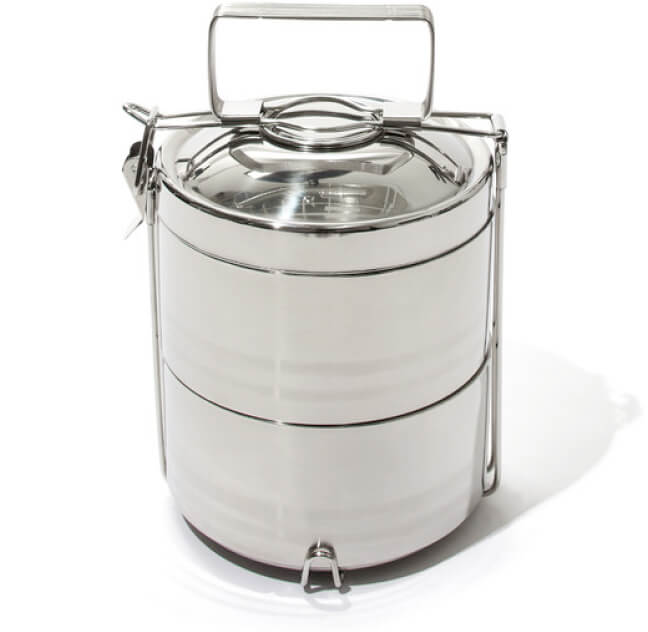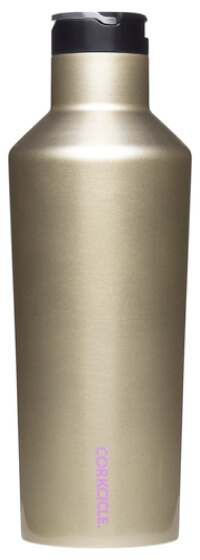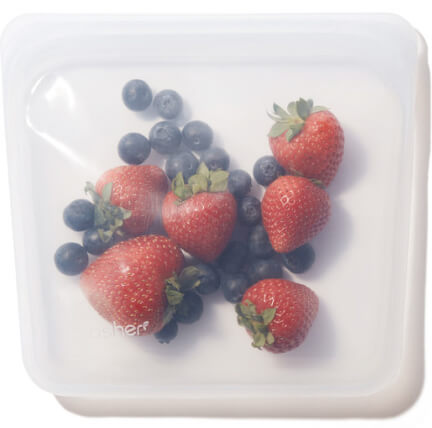[ad_1]

Photo courtesy of Dispatch Goods
The Minimalist

Andrea Arria-Devoe, a longtime editor at Daily Candy, is the executive producer of Straws, a documentary about how ditching plastic straws can make a massive difference to the environment. She is also on the Executive Advisory Board of Plastic Pollution Coalition. In her column for goop, Arria-Devoe explores everything from countertop composting and shopping bulk to environmental justice and shade equity.
Ordering in has always been a struggle for me. Before the pandemic, I almost always opted to cook a meal or dine in at a restaurant so I could eat on real plates with real silverware. If I did order in, it would be from places I knew embraced responsible to-go packaging to offset any single-use plastic panic attacks. But after nearly a year of cooking (and cleaning up) three meals a day for a family of four, I was feeling completely burned out on my kitchen duties. Not to mention feeling conflicted about my desire to support struggling restaurants.
After a recent move to New York City, I discovered DeliverZero, an online platform that allows customers to have food delivered from restaurants in reusable containers. You then return the containers directly to the delivery person on your next order or schedule a drop-off with a partner restaurant. Being able to enjoy Indian or Chinese takeout and support local businesses without packaging remorse has been a game changer.
The timeliness and need for reuse cannot be understated. Before the pandemic, an estimated 561 billion pieces of disposable foodware were used every year in the US alone. (This includes containers and lids, coffee cups, cutlery, napkins, single-use condiments like ketchup and mustard, straws, those plastic sticks coffee chains put in your disposable cup so it doesn’t spill, and plastic bags.) Stay-at-home orders and mandates that restaurants are allowed to offer only takeout and delivery have exacerbated the plastic pollution crisis created by a broken recycling system. According to the EPA, only 8.5 percent of all plastic waste is recycled. The devaluation of oil stands to make this figure even lower because using virgin plastic is much cheaper than using recycled materials. And with online restaurant delivery slated to take in about $77 million over the next four years according to The Wall Street Journal, the waste it will create is staggering.
Statistics aside, look no further than your local garbage can overflowing with single-use drink cups, straws, and water bottles to grasp the scope of the problem. GoBox, a reusable container system based in Portland, was created to tackle the excessive trash created by the city’s booming food truck scene a decade ago. Customers choose either a monthly or an annual membership subscription that allows a certain number of reusables to be borrowed at a time. Similar services exist in other forward-thinking cities with slightly different business models (see box below). What they share is a mission to break free from a throwaway culture and to help shift businesses and individuals toward a circular economy, one that values materials, collaboration, and partnership.
While COVID-19 has dealt a blow to citizens accustomed to bringing their own cups for a zero-waste coffee routine, it has given start-ups like Vesselworks an opportunity to step in to solve the disposable-cup problem. (Paper cups are not recyclable because of the thin plastic lining inside, which means 58 billion end up in landfill annually.) With locations throughout Boulder and Berkeley, the nonprofit operates a free reusable-cup-sharing program. As with a library book, users check out a double-wall-insulated stainless steel vessel at participating cafés and eateries and then have five days to return it to the restaurant or kiosk. Vessels are restocked after being sanitized at a health-department-certified facility.
So what if you don’t live in a city with access to reusable services? You can still advocate for less unnecessary waste when you order food.
Campaigns like Habits of Waste’s #CutOutCutlery and Reusable LA’s #SkiptheStuff successfully convinced UberEats and Postmates to change their delivery apps so that utensils are given only upon request. GrubHub will join the effort in the coming months. Postmates reports that since joining the campaign in October 2019, it has saved 122 million packs of plastic cutlery from entering the waste stream, the equivalent of $3.2 million in savings for restaurants. Habits of Waste is asking citizens to sign a petition encouraging the other big delivery platforms to do the same. The organization, along with Reusable LA, celebrated a win in early March when the Los Angeles City Council unanimously passed a motion making single-use plastic cutlery and accessories available by request only. Habits of Waste also recently presented the utensil opt-in idea to California and New York State senators and assembly members in the hopes of turning #CutOutCutlery into a bill.
Additionally, apps like Jybe help connect conscious consumers with food vendors committed to sustainable packaging practices. Users rate and review a restaurant’s to-go packaging by providing a photo and details like whether Styrofoam or compostable containers are being used. If a restaurant has a low rating, Jybe offers consulting services for eateries looking for guidance on how to make better packaging choices. It’s now available in Los Angeles, San Francisco, Seattle, Portland, Austin, Boulder, and Denver.
And lastly, don’t be afraid to speak up. Tell your favorite restaurants (politely) that you don’t need or want single-use plastic bags, straws, utensils, or condiments with your order. Even better, introduce them to a service that offers reusable takeout containers.
Start-Ups Offering Reusable Containers
Dispatch Goods
Currently available throughout San Francisco, this zero-waste container service delivers restaurant meals in stainless steel containers inspired by the Indian tiffin tradition. Restaurants like Zuni Café and Mamahuhu recently signed on with the company to commit to an all-reusable takeout model. The corporate membership is a plus for businesses or universities looking to foster wholesale sustainability. Dispatch places bins throughout campuses or buildings to make returns as easy as possible.
Usefull
This Boston-based cup-rental company aims to make ordering a coffee in a reusable cup as convenient as ordering its disposable counterpart. Users sign up for either a standard (free) or premium subscription, download the app, order a drink, and then return the sixteen-ounce stainless steel cup to a designated drop-off bin. Usefull provides materials, training, and marketing to participating cafés and restaurants as well as a tool for calculating the environmental impact and cost savings of switching to reusables.
GO Box
Created in response to overflowing trash cans resulting from Portland’s popular food truck scene, this ten-year-old service offers customers three different membership options based on the number of reusables checked out at a given time. The company has plans to expand to San Francisco.
Vessel Works
Similar to Usefull, this free zero-waste cup-sharing system has locations in Boulder and Berkeley. The nonprofit helps businesses like cafés, campuses, ski resorts, and event venues adopt the reusable-cup model through either full-service implementation or licensing software for container tracking.
Green to Go
This membership-based service out of Durham, North Carolina, lets customers order takeout or bring home leftovers in reusable plastic containers from twenty-five participating restaurants and grocery stores, then return the containers to a partner restaurant or a dedicated drop box.
ZeroGrocery
Available in Los Angeles and the Bay Area, Zero Grocery takes a similar plastic-free approach to online grocery shopping. You’ll see the usual mix—dairy, produce, meat, pantry items—along with prepared and bakery items like vegan chocolate mousse and fresh corn tortillas, all of it packaged in reusable glasses or compostable containers. Deliveries are dropped off in reusable totes that are then picked up with your next order.
Suppli
Recently launched in Toronto, this start-up allows customers to order takeout in stainless steel containers with silicone lids. Diners order through established online delivery platforms like UberEats or a restaurant’s website and pay a 99-cent-per-order usage fee. Suppli handles the sanitizing of containers so restaurants don’t have to.
Build Your Own Zero-Waste Kit
Food Storage
Beyond being incredibly durable thanks to the sleek stainless steel, what makes this nontoxic container so practical is the two-tiered sectioning, so you can separate your salad from your soup. What’s more, it’s brilliantly double-walled, meaning it keeps the hot stuff hot and the cold stuff cold. It even breaks down quickly for easy cleanup—sold.

Two-Layer Tiffin Food Storage Container
goop, $26
SHOP NOW
Water Bottle
There are many reasons why we love Corkcicle’s canteen, but if we had to rank them: 1) It’s triple-insulated (the mouth is wide enough to accommodate ice cubes), 2) it comes with a straw sip cap that’s great on the go (road trips, hiking trips, all the trips), and 3) that sleek, durable finish makes it a pretty good desk-mate if you ask us. Plus, you only need to knock back two of these bad boys to hit your water goal for the day.

40 oz Sport Canteen
goop, $45
SHOP NOW
Glass Straw
These reusable glass straws are perfect for gifting (keep a few on hand for unexpected occasions) and essential for environmental stewards of all ages. The best part about this one? It comes with a silicone travel case, so you can keep one in every bag, backpack, and glove compartment. Oh, and the other best part? It comes with the world’s teeny-tiniest squeegee tool to keep it clean.

goop Travel Straw
goop, $22
SHOP NOW
Reusable bag
A reusable nontoxic plastic-free alternative to your disposable sandwich bags, this practical pinch-seal pouch is made of 100 percent silicone. You can write on it, microwave it, and throw it in the dishwasher. Plus, it’s perfectly sized for sandwiches, snacks for the kiddos, fruits and veggies—anything.

Reusable
Sandwich Bag
goop, $12
SHOP NOW
[ad_2]
Source link